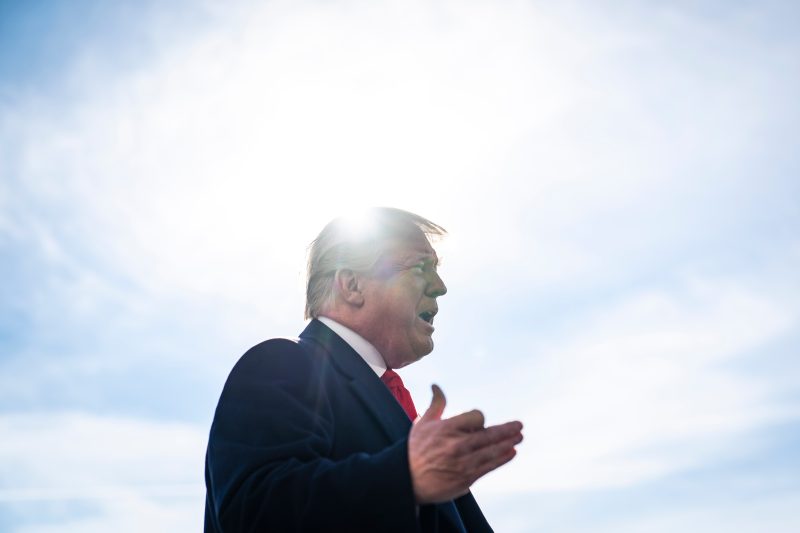
GOP sees potential crime in Trump hush-money case — if you ask the right way
The Donald Trump hush-money case — which could soon lead to the first criminal charges against the former president — occupies an unusual space among his various legal liabilities.
On the one hand, it would seem relatively small-bore compared to things like trying to overturn the 2020 election and unlawfully withholding sensitive documents after leaving the White House. On the other, when it comes to the paper trail and the underlying conduct, it’s rather cut-and-dried ethically, if not necessarily legally: Trump paid his lawyer to pay a porn star to prevent her potentially damaging claim from surfacing shortly before Election Day 2016.
And new data suggests even Republicans overwhelmingly view such conduct as a crime — at least in theory, and at least until you invoke Trump personally.
A new Economist/YouGov poll got at this in a telling and interesting way. It began by asking broadly whether it was “a crime for a candidate for elected office to pay someone to remain silent about an issue that may affect the outcome of an election.” The question didn’t mention Trump.
Americans overwhelmingly agreed it was; they said so by a 72 percent-to-11 percent margin. And Republicans agreed, 73-13.
The poll then asked whether it would also be a crime “to fail to report” such spending. Again, the answer was overwhelmingly yes — 76-8 overall and 76-11 in the GOP.
To be clear, Trump’s case at the very least would seem to fit the description of the first question.
His legal team disputes that Trump’s reimbursement of the hush money that Michael Cohen paid Stormy Daniels in October 2016 was illegal — and that Cohen’s payment itself qualified as a campaign expenditure that Trump needed to report. It says Trump would have paid the hush-money regardless of the campaign, so it didn’t have to be in his campaign filings.
But it’s difficult to argue against the idea that Daniels was paid to “remain silent about an issue that may affect the outcome” of the 2016 election. Trump has acknowledged reimbursing Cohen to keep Daniels quiet (while assuring Daniels’s claim of an affair was false). Even if the campaign wasn’t the only or even primary purpose, as Trump’s legal team suggests, Trump lawyer Rudy Giuliani has effectively acknowledged the allegation might well have been politically damaging.
But then YouGov asked about this in the context of Trump, and suddenly there was far less concern on the right.
It asked how “serious an issue is it that an adult film star was paid $130,000 in October 2016 to remain silent about an alleged sexual encounter” she had with Trump. Just 15 percent of Republicans said this sounded like a “very serious issue,” while a majority of Democrats did. More than half of Republicans said it was “not very serious” or “not serious at all,” despite this seeming to fit the description of what three-quarters of Republicans had just said was a crime. It also bears noting that the question was about whether there was a crime; not whether Trump himself had committed one.
So why the drop-off? Partisanship certainly plays a major role. But it also seems to be a matter of Republicans simply having forgotten — or never having known — the particulars of the case, and perhaps offering a more unvarnished view before they realized what the question was really about.
The same poll shows only 18 percent of Republicans said they’ve heard “a lot” about the hush-money case (compared to 39 percent of Democrats). And just 16 percent of Republicans said they’ve heard “a lot” about the potential criminal charges against Trump (compared to 35 percent for Democrats). In both cases, 4 in 10 Republicans said they had heard “nothing at all.”
Also driving home that point: When YouGov asked the initial “crime” question in August 2018, at the height of the controversy, just 37 percent of Republicans said it would be a crime to pay someone to remain silent about an issue that could impact the election.
That number has now shot up to 73 percent. And it’s not because Republicans have suddenly had an epiphany about whether such conduct is criminal; it’s because back then they intuited what the question was really about.
And this isn’t the first evidence that Republicans actually view the situation as rather problematic. Last year I recapped polling on Trump’s various controversies and whether Americans thought he had broken the law. Consistently, when given the opportunity to say Trump’s conduct was merely “unethical,” a majority declined to say Trump had broken the law.
But relative to Trump’s other pre-Jan. 6 controversies, the hush-money case ranked pretty high in terms of what people objected to.
Once we got the fuller picture of the situation by August 2018, an AP-NORC poll showed nearly 4 in 10 Americans said Trump had broken the law, and nearly 8 in 10 said his conduct was at least unethical. And an inordinate number of Republicans objected, as I noted this week:
There are many complex legal issues here. The baseline question would seem to be whether Trump falsified business records by listing the reimbursements as “legal expenses,” which would be a misdemeanor. Prosecutors could also charge a felony if they think they can prove the records were falsified in the service of another crime, such as the campaign finance violation Cohen pleaded guilty to. It’s hardly a slam dunk.
But these new data would seem to reinforce that the vast majority of Americans — Republicans included — see something legally problematic here. At least if you ask them in a certain way.
